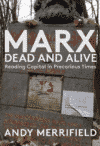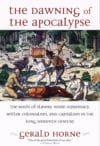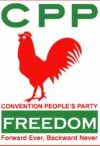Europe

With the advent of COVID-19, India’s rulers imposed the world’s most stringent lockdown on an already depressed economy, dealing a body blow to the majority of India’s billion-plus population. Yet the Indian government’s spending to cushion the lockdown’s economic impact ranked among the world’s lowest in GDP terms, resulting in unprecedented unemployment and hardship. Crisis and Predation shows how this tight-fistedness stems from the fact that global financial interests oppose any sizable expansion of public spending by India, and that Indian rulers readily adhere to their guidance. Meanwhile, under the banner of reviving private investment, India’s rulers have planned giant privatizations, and drastically revised laws concerning industrial labor, the peasantry, and the environment—in favor of large capital. | more…

Karl Marx saw the ruling class as a sorcerer, no longer able to control the ominous powers it has summoned from the netherworld. Today, in an age spawning the likes of Donald Trump and Boris Johnson, our society has never before been governed by so many conjuring tricks, with collusions and conspiracies, fake news and endless sleights of the economic and political hand. And yet, contends Andy Merrifield, as our modern lives become ever more mist-enveloped, the works of Marx can help us penetrate the fog. In Marx, Dead and Alive—a book that begins and ends beside Marx’s recently violated London graveside—Merrifield makes a spirited case for a critical thinker who can still offer people a route toward personal and social authenticity. | more…

As stated in the United Nations Universal Declaration of Human Rights, health is a fundamental human right. However, we find ourselves in the midst of the COVID-19 pandemic with a shortage of both human and material health resources, most of which must be sourced from the private sector. Some of the wealthiest countries—France, Italy, Spain, the United Kingdom, and the United States—have proved unable to respond rapidly. The evolution of public health over the past four decades, during which government health policies have reduced health services to commodities and objects of speculative investment, has led to the current crisis. | more…

In his book Chicano Communists and the Struggle for Social Justice, Enrique M. Buelna examines the life of Ralph Cuarón, a Mexican-American or Chicano seaman, furniture maker, father, husband, and lifelong activist who joined the Communist Party at age 19 during the Second World War. The Communist Party, however, largely ignored Mexican workers and local members were not pleased with his organizing of that segment of the working class. In the early twenty-first century, the Mexican question remained, although it became known as the “Latino question” after considerable immigration from Central America in the 1980s and ’90s. In their book The Latino Question: Politics, Labouring Classes, and the Next Left, Armando Ibarra, Alfredo Carlos, and Rodolfo D. Torres deconstruct the word Latino, arguing that it homogenizes an extremely diverse population. | more…

Indigenous and African resistance and intellectual traditions provide key insights to the very nature of capitalism and how it has unfolded throughout space and time, its tentacles emanating from Europe and stretching across the globe in the forms of imperialism and colonialism. | more…

August 2019 saw numerous commemorations of the year 1619, when what was said to be the first arrival of enslaved Africans occurred in North America. Yet in the 1520s, the Spanish, from their imperial perch in Santo Domingo, had already brought enslaved Africans to what was to become South Carolina. The enslaved people here quickly defected to local Indigenous populations, and compelled their captors to flee. Deploying illuminating research, The Dawning of the Apocalypse is a riveting revision of the “creation myth” of settler colonialism and how the United States was formed. Here, Gerald Horne argues forcefully that, in order to understand the arrival of colonists from the British Isles in the early seventeenth century, one must first understand the “long sixteenth century”—from 1492 until the arrival of settlers in Virginia in 1607. | more…

Gerhard Schrder, Angela Merkel, and the Liberal Roots of German Neofascism
In 2021, Angela Merkel’s fourth and last term as the chancellor of Germany will end. To understand Merkel’s domestic and foreign policy, one must understand the country she inherited. She came to power in 2005 following the first center-left government since 1982, the government of Gerhard Schröder, and was in the fortunate position of becoming chancellor after a coalition government of social democrats and Greens had done the devil’s bidding of implementing very unpopular neoliberal policies to the sole benefit of German capital and the rich. | more…

Twenty years ago, John Bellamy Foster’s Marx’s Ecology: Materialism and Nature introduced a new understanding of Karl Marx’s revolutionary ecological materialism. More than simply a study of Marx, it commenced an intellectual and social history, encompassing thinkers from Epicurus to Darwin, who developed materialist and ecological ideas. Now, with The Return of Nature: Socialism and Ecology, Foster continues this narrative. In so doing, he uncovers a long history of efforts to unite issues of social justice and environmental sustainability that will help us comprehend and counter today’s unprecedented planetary emergencies. | more…

Hilary Rose, a sociologist, and Steven Rose, a neuroscientist, were two of the principal founders of the British Society for Social Responsibility in Science in the late 1960s in London. They speak about their work as scientists and antiwar activists, particularly around the issue of Palestinian liberation. | more…

In 1952, the West African nation of Ghana, recently having freed itself from British imperialism, set out on a project of radical economic reconstruction unmatched anywhere on the continent in scope and ambition. Having attained political independence with the creation of a sovereign parliament and executive office, the Convention People’s Party under the leadership of Kwame Nkrumah drew up extensive plans for ensuring the conditions necessary for real, not just on-paper, independence. | more…

The main criticism leveled at the socialist economies was that a planned economy was inherently less efficient than a market one, due to the sheer scale of the bureaucratic task involved with planning a major economy. But the collapse of the Soviet and later the Russian economy under Mikhail Gorbachev and then Boris Yeltsin was an economic disaster that was otherwise unprecedented during times of peace. The world’s second superpower was reduced to the status of a minor bankrupt economy with a huge decline in industrial production and in living standards. | more…

Since the Great Financial Crisis of 2007–09, Hyman Minsky (1919–96) has been widely recognized as one of the late twentieth century’s most insightful economic theorists. Nevertheless, if Minsky had still been alive at the time of the Great Financial Crisis, there would have been little likelihood that his new-found reputation would have resulted in his receiving the Nobel Prize in Economics given his heterodox and socialist economic views. | more…










